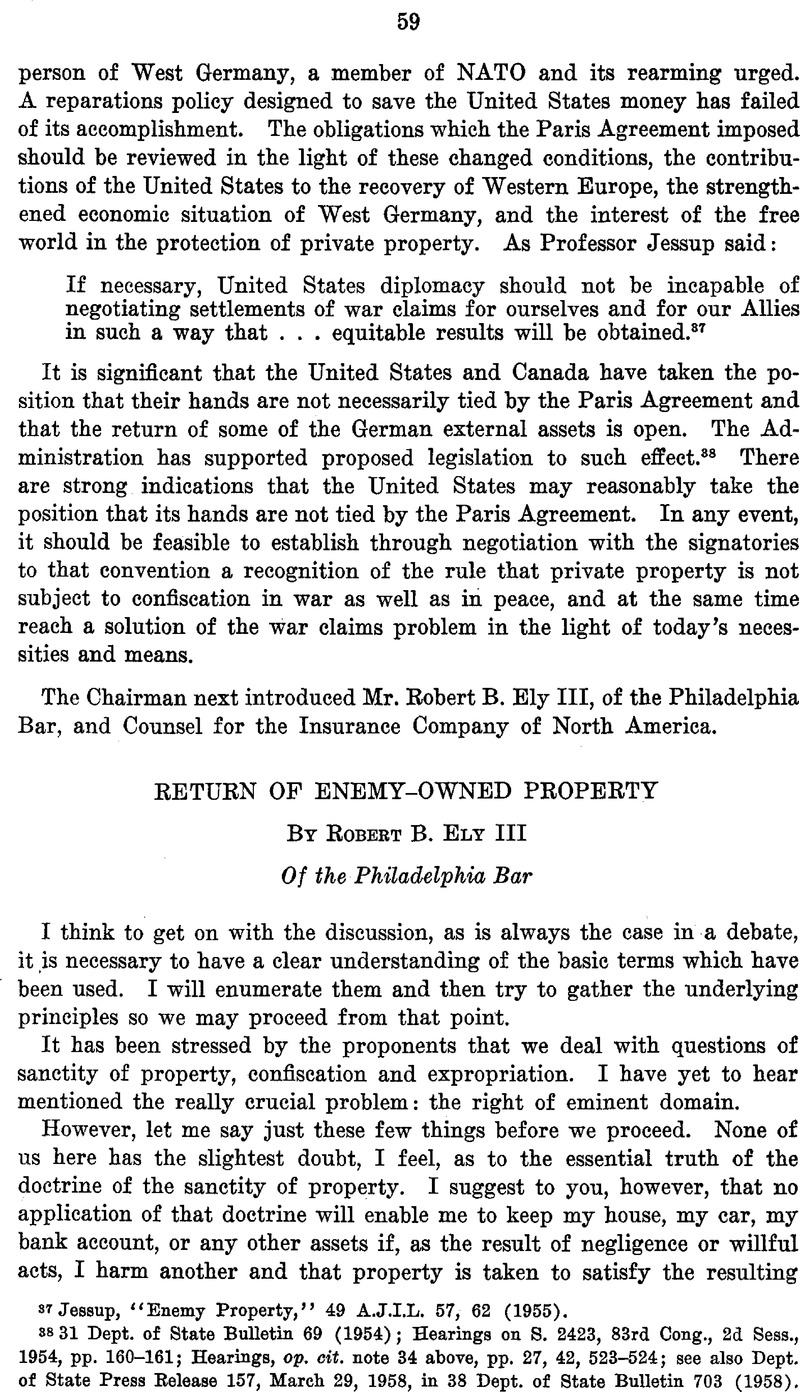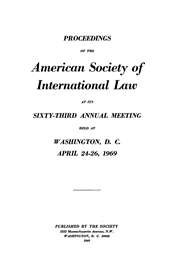No CrossRef data available.
Article contents
Return of Enemy-Owned Property
Published online by Cambridge University Press: 27 February 2017
Abstract

- Type
- Third Session
- Information
- Copyright
- Copyright © American Society of International Law 1958
References
1 The Statement of Senator Smathers, Hearings before a Subcommittee of the Committee on the Judiciary, U. S. Senate, April 4-6, 1957, p. 48 Google Scholar:
“These assets at the time of vesting were estimated to be worth approximately $375 million. They have, of course, under the administration of the United States during and after the War, increased tremendously in value. Their estimated value today is $600 million.…
“Out of the approximately $600 million, $275 million has been disbursed pursuant to law. Under the provisions of the War Claims Act of 1948, as amended, $225 million of the $275 million went to the War Claims Fund and was paid out against American Prisoner of War claims, or claims which other American citizens had against our former enemies. Approximately $50 million was utilized by the Office of Alien Property Custodian of the Department of Justice for administering the properties since 1941. This leaves an approximate balance of around $325 million, some of which must be held in trust since the properties represented thereby are in litigation in our courts and cannot be disbursed until the suits are finally disposed of. Other sums must be maintained by the Alien Property Custodian for operating expenses. However, of the $325 million, there is today deposited to the account of the Alien Property Custodian in the Treasury Department an amount somewhere between $100 million and $125 million of liquidated funds, which are immediately available.…”
2 Under the Trading With the Enemy Act, 50 U.S.C.A., App., sees. 1 et seq.
3 The Paris Agreement on Reparation of January 14, 1946 (U. S. Dept. of State Pub. No. 2584, European Series 12), p. 11; 14 Dept. of State Bulletin 114 (1946); 40 A.J.I.L. Supp. 117 (1946)Google Scholar.
4 62 Stat. 1240, sec. 12, adding Sec. 39 to the Trading With the Enemy Act, note 2 above:
“No property or interest therein of Germany, Japan or any national of either such country vested in or transferred to any officer or agency of the Government at any time after December 17, 1941, pursuant to the provisions of this Act, shall be returned to former owners thereof or their successors in interest, and the United States shall not pay compensation for any such property or interest therein. The net proceeds remaining upon the completion of administration, liquidation and disposition pursuant to the provisions of this Act of any such property or interest therein shall be covered into the Treasury at the earliest practicable date.…”
5 Cited in note 3 above. The relevant provisions are as follows: Par. I, Article I, of Chapter 6:
“The Three Powers undertake that they will at no time assert any claim for reparation against the current production of the Federal Republic.”
Par. I, Article III, of Chapter 6:
“The Federal Republic shall in the future raise no objections against the measures which have been, or will be, carried out with regard to German external assets or other property, seized for the purpose of reparation or restitution, or as a result of the state of war, or on the basis of agreements concluded, or to be concluded, by the Three Powers with other Allied countries, neutral countries or former allies of Germany.”
Article V of Chapter 6:
“The Federal Republic shall ensure that the former owners of property seized pursuant to the measures referred to in Articles 2 and 3 of this Chapter shall be compensated.”
6 Letter of Assistant Secretary of State Hill to Senator Smathers, Hearings, cited in note 1 above, page 261:
“In November, 1954, the British and French Governments expressed their concern about S. 3423 on the ground that a return of German assets would constitute a breach of obligation under the Paris Reparation Agreement and would create difficulties for the other signatories. Subsequently the Netherlands and Norwegian Governments advised the United States Government of their concurrence with the British and French views. The Government of the Netherlands also, in a separate and later message, expressed similar concern with respect to the administration bill (S.2227) submitted to the last Congress.”
7 As is said in 93 Corpus Juris Secundum 18, “A Sovereign may take against alien enemies whatever steps it deems necessary for national security, since an alien enemy has no rights other than those which the sovereign chooses to grant.”
8 8 U. 8. Stat. 178.
9 Insurance Company of North America v. U. S., 121 F. Supp. 649 (1954).
10 Gray v. U. S., 21 Ct. Cls. 340, 393 (1885).
11 In dealing with the problems of reparations -which the Germans were unable to pay, the parties to the Conference described themselves as “Trustees of a bankrupt.” Proceedings of the Paris Conference on Separation of 1945, Doc. CPE/P.V.5, Annex 4A.
Similar language has been used by the Federal courts in describing other situations in which the United States has received from another country funds to be used to satisfy the claims against that country by American citizens. See American-Mexican Claims Bureau v. Morgenthau, 26 F. Supp. 904, point 2 (1938).Google Scholar


